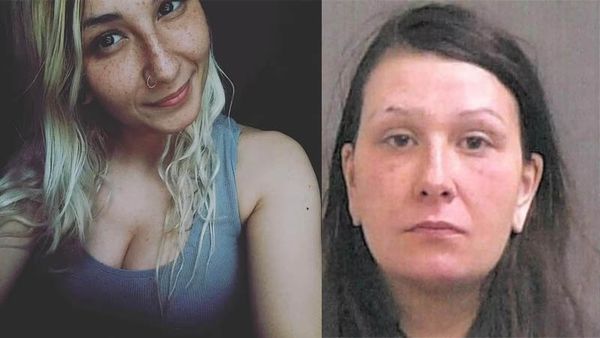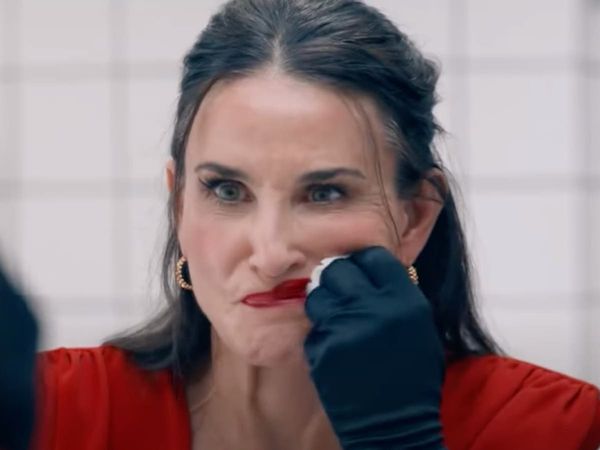Warning: This article contains details about the plot of “The Substance”
Carolie Fargeat’s bloody body horror film The Substance is currently everywhere and prompting plenty of discussion about women and our preoccupation with ageing (or not).
In the film Demi Moore plays Elizabeth Sparkle, a ageing once-Hollywood A-lister who faces the brutal realities of ageing in Hollywood when she’s fired from her daytime aerobics TV show on her birthday. Shortly afterwards a series of unfortunate events prompt a chance encounter that introduces Sparkle to ‘The Substance’, a radio-active-looking elixir that allows her send a youthful version of herself (“Sue” played by Margaret Qualley) into the world for seven days at a time.
Much has been written about Demi Moore’s Elizabeth Sparkle and what her character’s gory journey says about older women’s experience of ageing and ageism in 2024. But less has been said about 29-year-old Qualley’s Sue, who faces a crisis of her own.
Sue has an exaggeratedly short window of time to enjoy her youth and beauty. Every seven days she has to rotate with Sparkle, giving up the perks of youth that range from sex with male models and partying to raking in cash and validation in the limelight. Just like Sparkle, Sue finds herself working to a ticking clock that someone else has set. She dreads “switching”, is repulsed by Sparkle and is increasingly anxious about seizing opportunities while she has them. This leads to her playing a dangerous game, borrowing time to prolong her “youth” window.

How Are Millennials Feeling About Ageing?
Margaret Qualley turns 30 this month, placing her firmly in the “millennial” bracket which ranges between 26-41. She’s been open about the pressure she felt playing Sue.
The slight ex-ballerina and Chanel-girl, admitted in an interview with The Sunday Times that it took months of gruelling training the perfect curvy-petite-snatched Instagram-bikini body. Despite her efforts, she ultimately required prosthetic breasts to get her “Jessica Rabbit” body just right. Even perfect Qualley, who is playing younger than her age in The Substance, wasn’t perfect enough for Sue.
Given Sue and Qualley’s plight, it’s worth asking what The Substance says about younger women’s experiences of ageing.
Younger millennials in their twenties and mid-thirties grew up with toxic mid-2000s beauty ideals, but they’re also in a social media environment full of positive rhetoric around beauty, ageing and body image. But has this rhetoric been enough to make us comfortable with the realities of ageing?
What Do Cosmetic Practitioners Say About Their Millennial Patients?

In September, the UK publication Dazed covered the rise of “undetectable” beauty procedures. It was prompted by Christina Auguilera’s recent appearance on TikTok, which caused a stir. Viewers said that at 43, Aguilera looked so “naturally” good for her age that they “felt they were back in 2002.”
Dazed quoted Dr Prem Tripathi as saying “What people are doing to their face in the next year is going to blow you away,” alluding to advances in aesthetic medicine that will leave patients flawless without discernible intervention.”
Watch on TikTok
In The Substance, we see plenty of Sue’s silicone-smooth body; her thighs and derriere seem effortlessly cellulite-free. In Auguilera’s video, her moving image also looks obviously tampered with.
Dr Naomi McCullum, owner and founder of The Manse Clinics agrees that invisible treatments and smooth bodies will “f*ck with people’s heads.” She notes that anyone over 26 will be experiencing the first signs of ageing. She says that filtered images on screen, using the examples of shows like Big Little Lies and The Kardashians, can increase clients’ expectations of perfectly imperceptible “work” more than social media.
“I hate it being a cosmetic person because it makes expectations unrealistic.” Millennials make up a large proportion of her business, and she says they’re afraid of looking unnatural. “They’re choosing treatments that treat skin quality rather than things that change the shape of the face,” she explains. She says that, typically, patients start talking about ageing around 28 and express more urgent concern about it around 38. “There’s typically a period of denial in patients at the younger end of the spectrum,” she explains.
Dermatologist and cosmetic practitioner Cara McDonald at Complete Skin Specialists says this is consistent with what she sees in her millennial clients.
“They’re thinking ‘well they’re slowing down the ageing process and they’re going to look amazing at 40 and if I don’t get on board with all those things that everyone else is doing, I’m going to be left behind. It’s not about what they see in their own face that’s worrying them.
Dr Cara McDonald
It’s a fear that other people are getting something that will mean they’ll look great at 40 and I’m going to look old.”
From her perspective, millennials don’t want to look like they’ve had work done. “I spend a lot of time dissolving filler in this age group,” she notes saying that instead women in their mid-30s seem focused on “pre-juvenation”, skin boosters and perfectly balanced skincare regimes that set them up with the best chance of hanging onto their youth, rather than changing the shape of their face.
“People are in this whole ‘I’m going to embrace’ ageing and look after myself but try and slow it down, be natural.” she says. “Then in your 30s, when you actually start to see some signs of ageing, you’re like, ‘Oh f*ck that.” She says typically, at the very first signs of actual ageing, “people get frightened a little bit. They’ll start to seek interventions.”
She says millennial clients are less likely to seek corrections and instead use the language of stopping the clock. “Typically, patients ask, “How can I prevent this? How can I stop this? How can I slow this down rather than necessarily wanting to change things or fix things.”

A major shift Dr McDonald has seen is a sense of “fear of missing out” amongst millennials. McDonald says that social media, including the type shared by TikTokkers like Dr Prem Tripathi, which allude to “undetectable” treatments, has increased clients’ awareness of possible treatments and interventions. She feels that it’s creating a state of paranoia she describes as “insidious.”
“They are aware of what their peers could be doing and worry that their friends or colleagues may be imbibing secret boosters and elixirs and secretly winning an anti-ageing arms race.
“People are in this whole ‘I’m going to embrace’ ageing and look after myself but try and slow it down, be natural.Then in your 30s, when you actually start to see some signs of ageing, you’re like, ‘Oh f*ck that. People get frightened a little bit. They’ll start to seek interventions.”
Dr Cara McDonald
“They’re thinking ‘well they’re slowing down the ageing process and they;re going to look amazing at 40 and if I don’t get on board with all those things that everyone else is doing, I’m going to be left behind. It’s not about what they see in their own face that’s worrying them, it’s a fear that other people are getting something that will mean they’ll look great at 40 and I’m going to look old.” She says this even extends to women’s male partners coming in for treatments.
“They know what she’s getting and they don’t want to look like her dad when they’re in their forties, it’s interesting.” She describes the fear of missing out combined with an awareness of ‘undetectable’ beauty treatments as “quite insidious”. “There is a literal fear of ageing,” she says, “a fear that because their friends were spending money on their faces in their 30s, they’ll be left behind.”
What Millennial Women Are Saying About Ageing

Zoe, 33
Zoe, 33, says ageing has just started playing on her mind, and she feels more worried about it than things like her biological clock. “I am surprised by how much it bothers me,” she says. Zoe says while it sounds “conceited”, she’s been used to receiving positive feedback about her looks her whole life. “I remember my mum, who was attractive, talking about how once you hit 40, or have kids, nobody looks at you, people don’t help you in shops, people don’t go out of their way to talk to you,” she recounts, “at the time I thought ‘that’s depressing’ but now I actually think ‘how is my life going to change?”
She says that in her twenties, she wondered what she’d look like “theoretically” with bigger lips or less pronounced under-eye circles. “Now I don’t really care about that stuff but I super self-conscious of fine lines when I laugh and constantly think about sagging around my jawline after someone mentioned it as something you could treat. It’s the kind of stuff that makes me not want to share photos of myself.” It also irritates her to think people her age are having corrective or preventative treatments. “It is something that’s starting to really bother me, but it’s not something I have the financial means to do anything about which feels unfair.”
“I remember my mum, who was attractive, talking about how once you hit 40, or have kids, nobody looks at you. People don’t help you in shops, people don’t go out of their way to talk to you. At the time I thought ‘that’s depressing’ but now I actually think ‘how is my life going to change?”
Zoe*
Sally, 35
Sally is 34, and has a toddler. “I’ve been pretty acutely aware of it this year approaching my 35th birthday,” she says, “I read an article yesterday saying 36 is middle age, and that was a heaf*ck.”
Sally has been using injectables since her twenties, partly for fun “it was trendy to look frozen then.”
But now she’s become a mum and is “actually” tired her approach to beauty treatments has changed. She’s more focused on using well-placed treatments: “you know, something that makes me look less tired, less frowning, less grumpy. I don’t mind a few smile lines or wrinkles on my forehead, but I want stuff that makes me look fresher.”
Sally says that while she admires older actresses and models who embrace their silver hair or crows feet, she feels women in their thirties and forties fall into a “grey area”, where it’s not yet cool to look your age.
“When I’m getting down on myself about it, I’ve started noticing actors and women in films and going ‘they look their age’, and they’re pretty with expressive faces and thinner lips,” They look beautiful,” she says. “But in your thirties and forties, it’s like, you’re not old enough to have white hair and wear bright lipstick and funky glasses and let that be your thing. You’re not old enough to lean into but not young enough to not think about it.”
Alana, 30
Alana is 30 and says she’s not a huge fan of the filtered look she’s noticed in recent years, and doesn’t feel too phased about the prospect of getting older. “People just start to look all the same. But as long as people don’t erase their character, what’s wrong with a few tweaks.” She’s sanguine about ageing. “I’ll probably get some things done between now and being in the ground. I hope I won’t be hard on myself about what I look,” she says, adding that pro-ageing content from the “wrinkle makeup look” to simply creators in their 40s and 50s having fun with makeup do make her feel more positive about the prospect.
Names have been changed to protect interviewees’ identity
Related Posts:
- Are Gen Zs Ageing Faster Than Millennials?
- ‘Intentional Ageing’: Why Women Are Skipping Facelifts (And What They’re Doing Instead)
- Demi Moore Says She “Lost Herself” In Her Three Marriages
This article originally appeared on Marie Claire Australia and is republished here with permission.










